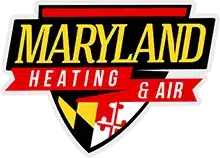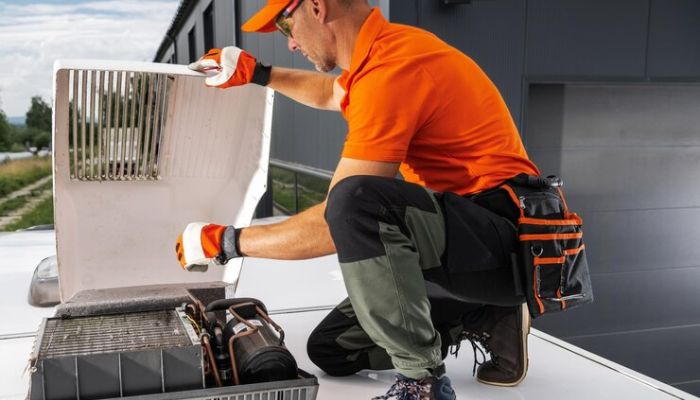A commercial HVAC system isn’t something you think about—until it stops working. When heating and cooling units struggle, businesses deal with unhappy customers, uncomfortable employees, rising utility bills, and even unexpected shutdowns. Sticking to a clear commercial HVAC maintenance checklist is the easiest way to prevent downtime and avoid expensive repairs.
This guide walks you through the specific monthly, quarterly, semi-annual, and annual HVAC tasks every facility should follow to keep their equipment running at peak performance.
Key Components of Commercial HVAC Maintenance
1. Inspection of HVAC Components
Routine inspections are the foundation of any good maintenance plan. During a commercial HVAC service visit, a certified technician will inspect the critical components of your system, including:
- Thermostats – Ensuring the thermostat is accurately measuring and controlling the temperature.
- Air Filters – Checking and replacing dirty or clogged air filters to maintain air quality and system efficiency.
- Belts and Pulleys – Inspecting for wear and tear and replacing if needed.
- Blower Motors – Examining the operation of blower motors, which distribute conditioned air throughout the building.
- Ductwork – Inspecting ducts for leaks, mold, and obstructions that may affect airflow.
These routine inspections are vital for detecting early signs of wear or potential malfunctions, helping to avoid costly repairs down the road.
2. Cleaning of HVAC Systems
Dirt and debris can accumulate over time, affecting the efficiency and performance of your commercial HVAC system. A thorough cleaning is part of regular maintenance and typically includes:
- Air Filters – Air filters are replaced or cleaned to prevent dust and contaminants from entering the system.
- Coils – The evaporator and condenser coils are cleaned to improve heat exchange efficiency and reduce energy consumption.
- Drain Lines – Clearing clogged drain lines to prevent water damage and mold growth.
- Vents and Ducts – Cleaning ducts and vents ensures proper airflow and helps improve indoor air quality.
Regular cleaning of these components ensures that your HVAC system runs smoothly and provides a healthier environment for everyone in the building.
3. Lubrication and Calibration
To keep your HVAC system running efficiently, moving parts such as fans and motors need to be properly lubricated. During a commercial HVAC service, technicians will:
- Lubricate Bearings and Motors – Reducing friction to extend the life of mechanical components.
- Calibrate Thermostats – Ensuring that the thermostat controls the temperature accurately, leading to better energy efficiency.
- Adjust Airflow – Balancing the airflow to ensure even temperature distribution throughout the building.
These tasks are essential for maintaining the performance and energy efficiency of your commercial HVAC system, ultimately lowering your utility costs.
4. Electrical System Checks
The electrical components of your HVAC system are critical to its operation. Faulty wiring or loose connections can lead to breakdowns or even pose safety risks such as electrical fires. During a commercial HVAC service, technicians will:
- Inspect Wiring – Checking for any signs of wear, loose connections, or fraying.
- Test Electrical Components – Ensuring that all relays, capacitors, and electrical controls are functioning properly.
- Check Circuit Breakers – Ensuring that circuit breakers are operating within safe limits and are not overloaded.
By ensuring that the electrical systems are functioning correctly, you can avoid downtime and potential hazards.
5. Refrigerant Level Checks
In cooling systems, refrigerant is the chemical responsible for transferring heat from the inside of the building to the outside. If refrigerant levels are low or there’s a leak, your HVAC system won’t be able to cool effectively. As part of commercial HVAC maintenance, technicians will:
- Check Refrigerant Levels – Ensuring they are within manufacturer specifications.
- Detect Leaks – Identifying and repairing any refrigerant leaks that may compromise the system’s efficiency.
Maintaining proper refrigerant levels is key to keeping energy costs down and preventing damage to your HVAC system.
Monthly Commercial HVAC Maintenance Tasks
These simple tasks, when done every month, prevent airflow restrictions and reduce strain on your HVAC equipment:
-
Replace or clean air filters
-
Clean supply and return air vents
-
Check thermostat accuracy and programming schedule
-
Remove dust from accessible components
-
Inspect for water leaks, rust, or unusual odors
-
Listen for strange noises or rattling inside indoor and rooftop units
During this stage, many facility managers choose to work with commercial HVAC contractors to handle multi-unit buildings and rooftop systems safely and efficiently.
Quarterly Commercial HVAC Maintenance Checklist
Every 3 months, your HVAC unit needs deeper attention to maintain efficiency and prevent wear and tear:
-
Clean condenser and evaporator coils
-
Check refrigerant levels and pressure
-
Lubricate motors, bearings, and moving parts
-
Inspect and tighten electrical connections
-
Check blower motor performance
-
Inspect belts for wear, tension, or looseness
-
Confirm airflow across the entire building
Skipping quarterly tasks is one of the most common reasons businesses later face costly commercial hvac repair.
Semi-Annual Maintenance for Seasonal Peak Performance
Before summer and winter arrive, the HVAC system must be prepared for temperature extremes. Both heating and cooling demand peak during these seasons.
Checklist for semi-annual tune-ups:
-
Inspect heat exchanger for cracks or signs of corrosion
-
Recalibrate thermostats and temperature sensors
-
Inspect and repair ductwork leaks
-
Check safety controls to prevent overheating or freezing
-
Clear clogged drain lines and pans to avoid overflow
-
Evaluate humidity levels and ventilation balance
These tune-ups ensure your HVAC doesn’t get pushed past its limits during the times when buildings rely on it most.
Annual Commercial HVAC Maintenance Priorities
Once a year, the system should undergo a total performance review—not just cleaning.
Annual tasks that protect equipment long-term:
-
Full system performance and efficiency test
-
Airflow and static pressure evaluation
-
Inspect for refrigerant leaks using electronic detection tools
-
Review energy usage trends to spot declining performance
-
Check compressor operation, ignition system, and control board
-
Perform a full safety inspection of electrical components
-
Conduct a lifecycle assessment to determine replacement timeline
For long-term budgeting, many managers reference resources covering how long commercial AC units last as part of planning for future upgrades:
Using replacement forecasting ensures the business isn’t hit with sudden HVAC expenses.
Final Takeaway: Consistency Is the Key to HVAC Reliability
Commercial HVAC maintenance isn’t a once-a-year activity—it’s an ongoing process that protects your building, your employees, and your bottom line. A consistent schedule ensures your system runs efficiently, avoids breakdowns, and continues delivering dependable indoor comfort year-round.
If you’re unsure where to begin or don’t have a maintenance schedule in place, partnering with a reliable HVAC provider can ensure every step—monthly, quarterly, semi-annual, and annual—is handled correctly and on time.


 855-410-TECH(8324)
855-410-TECH(8324) APPLY FOR FINANCING
APPLY FOR FINANCING